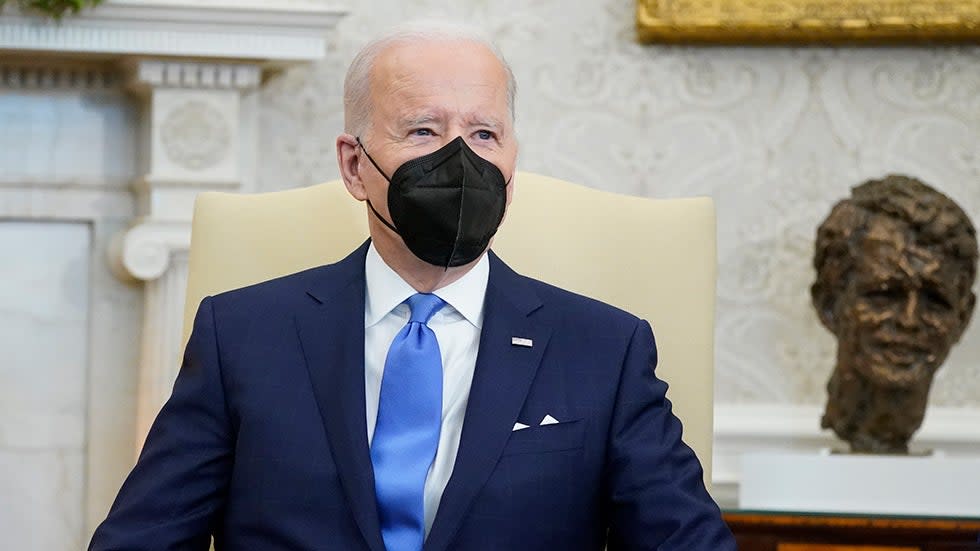The Memo: Biden caught between CDC and Democratic governors on COVID-19

President Biden is being put in a difficult spot on COVID-19 - and this time he can thank Democratic-led states for the conundrum.
Four states, all of which have Democratic governors, have announced in recent days that they are going to lift mask mandates for schools. Separately, deep-blue California is going to end its policy of requiring vaccinated people to mask while indoors next week.
But the Biden administration has promised to follow the guidance of scientists, specifically those at the Centers for Disease Control and Prevention (CDC). The CDC has not yet issued any change to its guidance on masking.
That leaves Biden in a bind.
The White House risks looking overly cautious on restrictions if it sticks with the status quo - a dangerous political position in a nation that has grown frustrated and restless after two years of pandemic restrictions.
On the other hand, the White House doesn't want to sound an all-clear that turns out to be premature.
It knows how dangerous that can be.
Biden's July 2021 declaration, timed to coincide with the Independence Day holiday, that the nation was on the verge of being able "to declare our independence from a deadly virus" has come to be seen in retrospect as one of his worst moments in the fight against COVID-19.
A May 2021 announcement from CDC Director Rochelle Walensky that vaccinated people could stop wearing masks was not much better. The call had to be reversed just two months later.
White House press secretary Jen Psaki pushed back when asked at Tuesday's media briefing about the apparent discrepancy between the administration's position and that of California as well as the states that are lifting school mask mandates: Connecticut, Delaware, New Jersey and Oregon.
"We don't look at it through that prism," Psaki responded, when asked if the states were, in effect, overruling the CDC.
As to whether or when the administration's position would change, Psaki responded: "You'll have to ask the CDC. The CDC moves at the pace of data and science."
Even public health experts understand the political dilemma that the president and his aides are in.
"I think there is a huge political risk to the CDC and the White House," Lawrence Gostin, a Georgetown University professor and expert on global health law, told this column.
"Already you are seeing a large swath of public opinion opposing CDC 'dictating' mandates. They see the case numbers plummeting and they see Democratic governors lifting mandates. There is enormous political peril for the White House."
Yet, at the same time, Gostin and others in public health understand the need to tread warily. The professor said that he believes it is premature to make sweeping changes to mandates, whether for children or the population at large.
He cited three factors: the risk of the receding omicron wave becoming resurgent if the public lets its guard down; the fact that hospitals remain overburdened and have built up a serious backlog for non-coronavirus treatments; and the relative scarcity of monoclonal antibody treatments and effective oral antiviral medication for those unfortunate enough to be stricken by COVID-19.
"We have made the same mistake time and time again for the past two years," Gostin lamented. "As soon as there is a ray of hope we lift everything - and the plague rains down on our head again."
Other public health experts echoed that sentiment.
"I don't see the data supporting that decision," professor Odis Johnson, executive director of the Johns Hopkins Center for Safe and Healthy Schools, told this column, referring to the lifting of school mask mandates.
Asked whether he thought the governors who were lifting such mandates were bowing to political pressure, he responded: "That is the only conclusion I can draw, especially since the CDC has largely been silent ... Without that guidance, I have no clue why they think now is the perfect time."
Even so, the political pressure is intense. The omicron-driven surge in new COVID-19 cases is falling rapidly. There is increasing public discussion of the damage that may have been done to children, both emotionally and educationally, by the disruptions of the past two years. And the general public is desperate to move on.
In an Economist/YouGov poll released last week, 36 percent of Americans asserted that "the worst part of the pandemic" is behind us, almost twice as many as the 19 percent who predicted it "is going to get worse" - and infection rates have dropped even more sharply since then.
That is the kind of sentiment some of the Democratic governors may be reacting to as they lift mandates.
New Jersey Gov. Phil Murphy (D) announced that schools could lift their mandates in his state beginning March 7, calling the move "a huge step back to normalcy."
Experts like Gostin understand public sentiment - but want the public and political leaders to sustain restrictions just a little longer.
"If I were a governor I'd say, 'We are really optimistic that all of these trappings of the pandemic that are affecting your life and have made you unhappy for so long are going to be lifted. But not until we have assurances that the case rate is going to go down and stay low, the hospitals are going to be at normal capacity and we are going to have effective life-saving treatments widely available. Just hold on,' " he said.
The problem, for governors and perhaps for the president too, is that "just hold on" may no longer be a sellable political message.
The Memo is a reported column by Niall Stanage.
